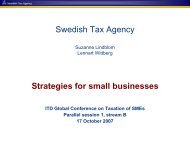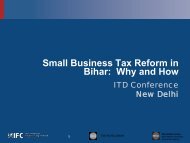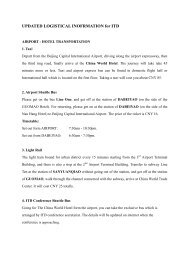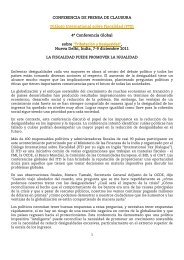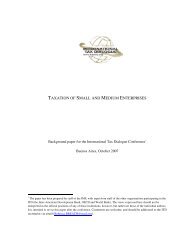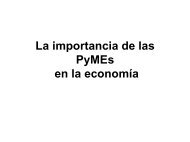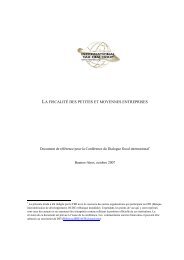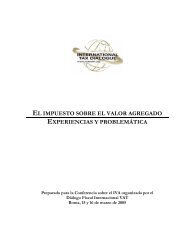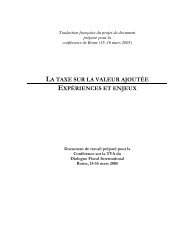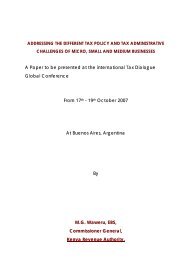Arcotia Hatsidimitris - International Tax Dialogue
Arcotia Hatsidimitris - International Tax Dialogue
Arcotia Hatsidimitris - International Tax Dialogue
You also want an ePaper? Increase the reach of your titles
YUMPU automatically turns print PDFs into web optimized ePapers that Google loves.
5. MAINTAINING PROGRESS, TACKLING DELAY – 43<br />
other hand business and its advisers can sometimes deliberately seek to overwhelm tax administrations<br />
with business records documentation, in the expectation that it will not be examined in any detail or, if<br />
it is, the enquiry or audit will be subject to lengthy delay. This is not, of course, an approach without<br />
risk for the business which can be surprised by material submitted to the tax administration if it has<br />
been provided without sufficient prior review.<br />
Traditional methods of manual document review are not able to analyse volumes of<br />
documentation that can run into millions of pages within a reasonable timeframe. This is a problem<br />
that the UK faced in preparing a major transfer pricing case for possible litigation and which it<br />
overcame by involving an external law firm. The key points from that case are summarised below.<br />
Box 7. United Kingdom Experience of using a Private Sector Law Firm to manage documentation<br />
This transfer pricing case was the first in which HMRC had retained a private law firm, as opposed to<br />
using its in-house lawyers, to assist in the preparation of a case for litigation and to act as<br />
intermediaries with legal counsel who would represent HMRC in court. This was not a decision taken<br />
lightly, given the substantial cost to HMRC, but reflected the complexity and, in particular, the<br />
document management challenges posed. Involving the private sector law firm enabled HMRC to<br />
access its specialised document management systems and to take advantage of its experience in<br />
managing and controlling large scale documentation review exercises including the engagement of<br />
suitable paralegals to assist with the task. In this case around 30 000 documents plus 2.7 million<br />
pages of spreadsheets supplied by the taxpayer in response to an initial information request were<br />
reviewed in 4 months enabling efforts to be concentrated on key issues and a further, tightly<br />
targeted information request to be drawn up and issued within a correspondingly short timescale.<br />
The importance of good communication<br />
The FTA Study of <strong>Tax</strong> Intermediaries recommends an enhanced relationship between tax<br />
administrations and their large business customers. This relationship is to be built on engagement at all<br />
levels from the Board down. There is growing evidence from tax administrations and tax advisors<br />
alike that good quality engagement improves compliance and early resolution of issues. Poor<br />
engagement in transfer pricing can result in protracted and unfocused audits and enquiries creating<br />
unnecessary costs and uncertainty for all.<br />
Chapter 3 explains the value of face to face meetings at the outset of an enquiry. Such meetings<br />
serve to ensure that the business is properly understood and the scope of any further investigation is<br />
appropriate. Maintaining good communications with the business and their advisers during the course<br />
of the enquiry is important too. There are a number of relatively simple ways in which channels of<br />
communication can be kept open and progress maintained.<br />
While transfer pricing enquiries inevitably involve the examination of a significant amount of<br />
underlying documentation and subsequent analysis, which needs to be set out in writing, lengthy<br />
exchanges of correspondence are often less effective than maintaining ongoing and face to face<br />
dialogue about the issues. If the audit or enquiry team is proposing an analysis of the facts that is<br />
likely to lead to an adjustment it is important that the reasons for doing so, given the facts of the case,<br />
are clearly understood. That understanding is often more easily achieved through a face to face<br />
discussion. The advisers we spoke to said that the reasons for proposing an adjustment were not<br />
always clearly set out.<br />
DEALING EFFECTIVELY WITH THE CHALLENGES OF TRANSFER PRICING © OECD 2012



